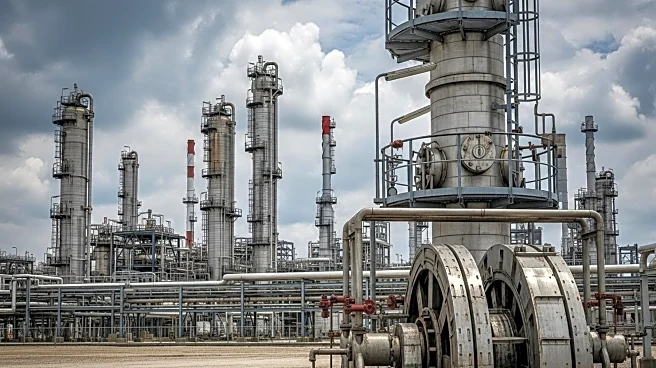What is the story about?
What's Happening?
The Dangote Petroleum Refinery has announced the suspension of petrol sales in naira, effective from September 28, 2025. This decision comes as the refinery has exhausted its crude-for-naira allocation, prompting concerns among Nigerian petroleum marketers about rising fuel prices and foreign exchange pressures. The suspension coincides with an industrial dispute, as the Petroleum and Natural Gas Senior Staff Association of Nigeria (PENGASSAN) accuses the refinery of dismissing 800 Nigerian workers who had recently unionized. The refinery management, however, claims that only a few workers were affected due to a reorganization aimed at addressing safety concerns. The refinery, a key player in Nigeria's energy sector, faces challenges that could impact ongoing petroleum sector reforms.
Why It's Important?
The suspension of naira sales by the Dangote Refinery could significantly affect Nigeria's fuel supply and pricing, potentially leading to increased fuel costs. This development is critical as the refinery plays a vital role in stabilizing fuel prices in the country. The labor unrest and allegations of unfair dismissals could further exacerbate the situation, leading to prolonged disruptions in operations. The outcome of these events could influence the broader petroleum sector reforms in Nigeria, affecting both domestic and international stakeholders. The situation highlights the delicate balance between labor relations and operational efficiency in critical industries.
What's Next?
The refinery's decision to halt naira sales and the ongoing labor dispute may prompt government intervention to stabilize the situation. Stakeholders in the petroleum sector, including government agencies and labor unions, are likely to engage in negotiations to resolve the conflict. The refinery's management may need to address the concerns of the dismissed workers and ensure compliance with labor laws to prevent further unrest. Additionally, the impact on fuel prices and supply will be closely monitored by industry analysts and policymakers, who may consider policy adjustments to mitigate potential economic repercussions.















